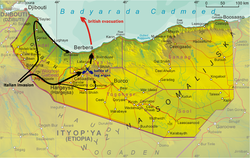| Battle of Tug Argan | |||||||
|---|---|---|---|---|---|---|---|
| Part of The East African Campaign of the Second World War | |||||||
 Map depicting the Battle of Tug Argan and the British evacuation | |||||||
| |||||||
| Belligerents | |||||||
|
| |||||||
| Commanders and leaders | |||||||
|
Reade Godwin-Austen Arthur Chater |
Carlo de Simone Guglielmo Nasi | ||||||
| Strength | |||||||
| 5,000 regular and colonial infantry |
30,000 Italian troops Somali auxiliaries | ||||||
| Casualties and losses | |||||||
|
38 killed 102 wounded 120 missing 7 aircraft destroyed 5 artillery pieces captured 5 mortars captured |
465 killed 1,530 wounded 34 missing | ||||||
The Battle of Tug Argan was fought between forces of the British Empire and Italy from 11 to 15 August 1940 in the Somaliland Protectorate (British Somaliland, Somali: Dhulka Maxmiyada Soomaalida ee Biritishka, now Somaliland). The battle determined the result of the Italian invasion of British Somaliland in the East African Campaign of the Second World War.
Italian troops were advancing northwards on a north–south road toward the capital of Berbera through the Tug Argan gap (named after the dry river bed tug running across it) in the Assa hills, when they were confronted by a British garrison in fortified positions on hills across its breadth. Italian infantry, after four days of battle, overran the undermanned British positions and were able to seize the gap, compelling the defenders to withdraw to Berbera.
The Italian victory made the position of British forces in Somaliland untenable and the British colonial authorities evacuated the garrison by sea. Italy was able quickly to secure the territory, an achievement whose propaganda value to the Fascist regime was greater than its strategic importance.
